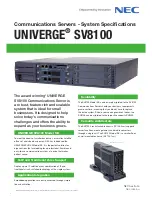
1/20/97
N
N
T
T
S
S
-
-
2
2
0
0
1
1
.
.
M
M
A
A
N
N
A
A
-
-
3
3
R
R
e
e
v
v
A
A
Reference Clock Identifier
A-1.11
The reference clock identifier is a 32 bit code identifying the particular type of timing
source. Strata 0 and 1 use a four-octet, left justified, zero-padded ASCII string.
TrueTime’s NTS-100 module operates as Stratum 1 and uses this four-octet string based
on the local time source input as shown in the table below. This setting is determined
based on the NTS-100 synchronization input option.
Local Source
Input
Reference Identifier
String
GPS
“GPS”
IRIG B
“IRIG”
1 PPS
“1PPS”
ACTS
“ACTS”
Reference Timestamp
A-1.12
The reference timestamp is a 64 bit timestamp format representing the local time at the
last update. TrueTime’s NTS-100 module’s reference timestamp is the last time that a
valid synchronization source signal was present.
Originate Timestamp
A-1.13
The originate timestamp is a 64 bit timestamp format representing the time that the
request left the client host.
Receive Timestamp
A-1.14
The receive timestamp is a 64 bit timestamp format representing the time that the
request arrived at the service host.
Transmit Timestamp
A-1.15
The transmit timestamp is a 64 bit timestamp format representing the time that the reply
left the service host.
Authenticator
A-1.16
This is a 96 bit field containing the authenticator information as described in Appendix C
of RFC-1305. This field is not implemented by the NTS-100.
A-2
SNTP V 3.0 DATA FORMAT PER RFC1361
A-2.1
When the NTS-100 replies to requests from SNTP clients, the packet format is the same
as the NTP packet format described above, with these differences:
Leap Indicator
A-2.2S
The NTS-100 will set these 2 bits to either 0 (normal) or 3 (unsynchronized) only.
Version Number
A-2.4S
The NTS-100 will copy this field from the client request packet and return it in this field.






































